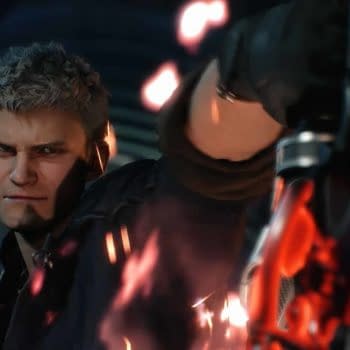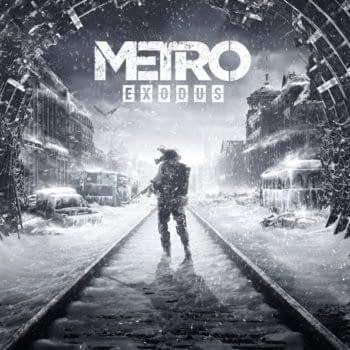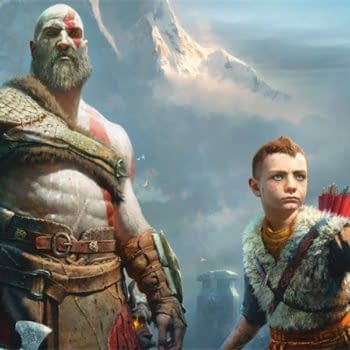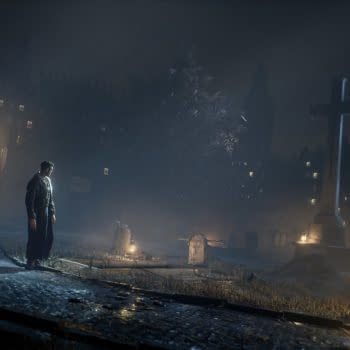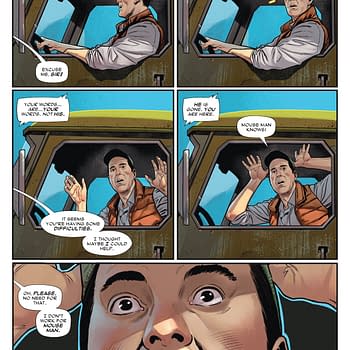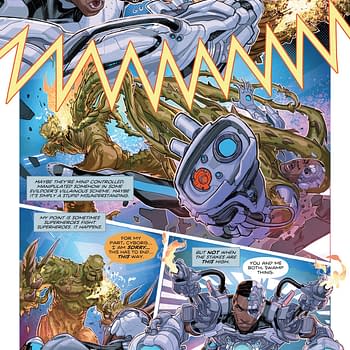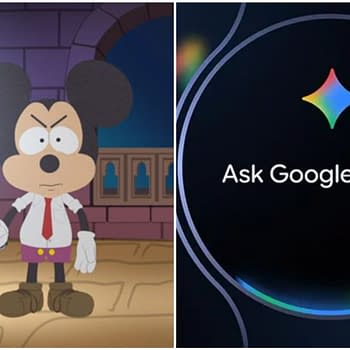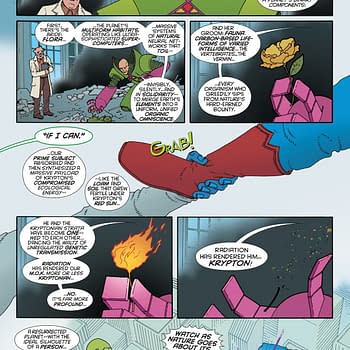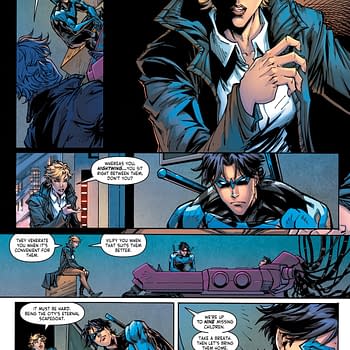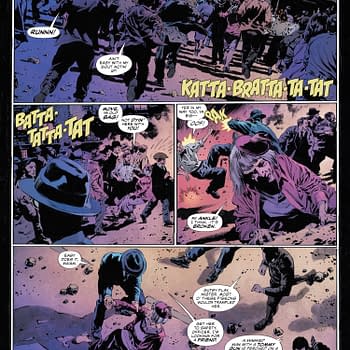Posted in: Comics, Recent Updates | Tagged: Comics, entertainment, felside, lucifer, mike carey
Mike Carey Would Totally Write An Episode Of Lucifer… An Interview On The Fellside
By Olly MacNamee
With an impressive writing career in comics, as well as a growing sideline as a critically acclaimed novels and now screenwriter too, Bleeding Cool caught up with Mike Carey on a tour of bookshops here in the UK promoting his new novel, Fellside, to talk about that, his previous novel, soon to be a film, The Girl With All The Gifts, and of course, his comics' work. Buckle up though readers as it gets pretty deep pretty quickly as we spoke on subjects such as the state of the modern British prison system to the very nature of reality itself.
Olly MacNamee: It's an unwritten rule, surely, that zombie apocalypses happen, they're not explained. Yet, you do break that rule, and in a very novel way. What gave you the idea behind the origins of the 'Hungries' in your previous novel, The Girl With All The Gifts?
Mike Carey: That's an interesting question. It came in piecemeal to me really. You know there was a short story before there was the novel and in the short story I just bluffed it and blamed it on a virus. But, when I came to start writing the novel, I thought the virus excuse was a cheap one and it would have been nicer to have something with some scientific dimension to it. One of the throughlines in the novel, is the scientific study going on in which the kids, including Melanie, are lab rats. You need to believe in that, the challenge that Caldwell (the scientist) is facing. I remembered watching the David Attenborough documentary, Planet Earth which show cordyceps bursting out of the head of a dying ant and it's the most terrifying thing to watch, it's pure science fiction. Then, when I dug deeper, I realised that this wasn't that rare in nature to have organisms that can control your mind. There are fungi that can do it, diseases that can do it, there are nematode worms that can do it; there are all these organisms that basically treat other creatures as unattended cars that you can just hop into and drive away. There are even some that affect mammals too. It seemed like a really good premise for a 'zombie apocalypse'.
OM: Yes. I found it to be a very satisfying and novel reason behind the existence of these Hungries, as you call them. I also liked the multiple perspectives you present in The Girl With All The Gifts too. Is this a narrative technique you adopt in your new novel, Fellside?
MC: It is, although in the first draft it was a single point of view.
OM: Was that Jess, the prisoner at Fellside?
MC: No. Actually, it was Sylvia Stark, a very minor character in the novel, an evil, obsessive nurse who tries to kill Jess right from the outset. I chose her because she's tangential to the story, someone who is looking onto the tragedy that unfolds and a tragedy she doesn't understand, or her own part in it. But, it didn't really work because it forced me to talk around certain things, and delay certain reveals, so I recast it with multiple points of view. Yes, it's the same kind of storytelling device as The Girl With All The Gifts, but it isn't in the present tense, like 'Girl'.
I was very concerned not to do a follow up to Girl; the same kind of flavour, the same kind of storytelling. I wanted to branch out a bit and it is a very, very different book. Fellside is a ghost story and as such, the balance between the real world elements and the fantastical elements is different in Fellside. If you take away Alex, the ghost, Fellside is a prison narrative in some ways, reflective of other classic prison based narratives, with familiar character types such as Harriet Grace, the woman who runs all the rackets in the prison, Dennis Devlin, the corrupt warder… what I wanted to do, also, was to say something about the present state of British prisons.
Private prisons, sadly, are the future because they are so cheap compared to the public alternative. It takes it off the government's books and places it into the hands of corporations who pick up the tab. The cost of such as system is that you then get the perverse incentives of Capitalism kicking in. You are talking about companies whose product are prisoners, and so they can only increase their profit if they either have more prisoners or if they keep their prisoners for longer. So, these companies will be lobbying the government to change the law, to put more people in prison, and for longer time too.
OM: Are we going too far, as a country, down the route of the American privately owned prison system which has been well documented as a terrible place to end up?
MC: Yes. And, I think it's a disastrous model to follow. I've spoken to prisoners who have been in both public prisons and private prisons, and in some ways private prisons are seen as better. They're all new builds, with state of the art facilities but in other ways they are terrible places to be. Because of the way funding works. Every violent incident is going to cost the prison money. So, there is quite a lot of evidence to suggest they simply suppress these incidents, persuade prisoners not to file complaints, not to ask for protection. They will write up an incident where one prisoners is beaten up by about a dozen others but write it up as a number of separate incidents happening in different parts of the prison, If you don't feel safe, it's no surprise that suicides are on the rise, as well as cases of mental illness and I think it's because the emphasis is shifting from rehabilitation to containment, for which the companies will gain more money, of course.
OM: Were you aware of these issues before researching for Fellside?
MC: It's part of the reason why I chose a prison setting, although there were lots of other reasons too. For example, claustrophobic settings, I love them. I love settings where a small cast of characters are forced to interact with each other. The military base in The Girl With All The Gifts is another such place, Fellside even more so. From a dramatic point of view, it's irresistible.
But, I do worry a lot about what is happening with British prisons. I feel at the moment that all the decisions being made are all the wrong decisions and made for the wrong reasons. There's already been a case in America, where two circuit court judges were caught taking bribes from the company that owned and ran the local youth detention facilities and they were banging kids up for something as minor as spitting on the pavement, or badmouthing a teacher of social media and given three months, six months custodial sentences. They were ruining these kids' lives for the sake of profit thanks to these backhanders.
OM: Yes, they simply become commodities and no longer individuals, people.
MC: If you talk to people who run drug rehab services, they will tell you that every woman within the prisons with an addiction there is a history of social services failing to intervene. Prison is never the right answer to these problems people genuinely have.
OM: It's sad that privatisation, whether it be prisons, or schools, is going to make society worse and worse as it becomes the norm, rather than the exception to a robust and thriving public sector.
MC: And it's all to keep the costs down. It's utterly sick. From 1993 to 2012, the size of the British prison population has doubled to over 90,000+. Home Secretaries know that you will never lose votes if you claim you'll be tougher on crime. We're going to bang up more people.
OM: Fellside, then, seems to be a rather thought provoking novel. Is this something we could with more of in comics? After all, your work on Lucifer looked at the very notions of free will, Unwritten looks at the very nature of reality itself…
MC: Well, when I come up with an idea, it's always character's first and a setting, and then I build the story. I've learnt the hard way over thirty years, for me, it's the only way that works. If you start with the story, you end up with two dimensional characters. You build the story around the characters, so I'm never consciously thinking of themes that my story will address. Having said that, I don't think you can write without it coming from your perspective, from how you look at the world around you. In The Unwritten, that is an exception as we definitely set out to write a story about stories and the extent to which stories are the only things that really matter. Ambrosio says in the first issue that stories are the only thing worth dying for. We have a more radical position even than that: stories are the only thing there is. We think we live in a real world, we don't. We live in stories about ourselves in the story of the real world. There is a lot of psychological research to suggest that the self, our sense of self, is a narrative. You don't behave consistently. You are influenced by the people you are with, the environment, there are lots of different situational factors at play. You think you're behaving consistently, but you're not. That's the story you tell yourself though. Obviously, societies have their stories, their creationist myths and their present state.
OM: Of course, our first lesson in morality come from fairy tales and folklore when we're just toddlers. Your Lucifer, of course, is based on the very concepts explored by Milton in his epic narrative poem, Paradise Lost. And, whether William Blake wanted to create a hero out of the Devil in his poem, The Marriage of Heaven and Hell, he did. What is it about character of Lucifer that draws writers to him.
MC: Of course, Blake said that Milton was at the Devil's party and all poets are. You can't be creative without being on Lucifer's side, because the very act of creation is to pull against order, pulling it apart to see what it's made of.
I think Lucifer is powerful figure because he's got such a wide range of possible meanings. I think that all myths that survive survive because you can apply them in so many different ways to life and your own life. Lucifer starts off as the Adversary to God, the embodiment of the darker impulses in our nature. The moment you do embody him the more he becomes attractive and glamourous. You are thinking, 'Actually, he's pretty cool.' Milton does not set out to make a hero out of Lucifer in Paradise Lost. He's supposed to be the bad guy but he's the most interesting character in the story. In Books 6 and 7, the War of Heaven, it's basically heroic fantasy with Lucifer the big guy holding the biggest sword, like Conan. You end up rooting for him. Milton's Messiah comes off as smarmy and a bit of a mummy's boy. Lucifer certainly has all of the best lines in this poetic epic. And then Blake comes along and makes him the embodiment of will and energy…
OM: and imagination…
MC: … and then explicitly links God with the power that sets limits, that says, 'No!' And Lucifer transgresses that and goes beyond the limits. Again, who are you rooting for?
OM: Finally then, Mike, it was announced recently that Lucifer will be renewed for a second season. You've written the screenplay for the film adaption of your novel, The Girl With All The Gifts, would you be interested to write the odd episode of Lucifer?
MC: Damn straight! I would totally do that and do my damnedest to sneak in a story from the comic book series. I think American networks will go with known American writers with proven track records, but you never know.
OM: You never know who might be reading this, Mike. Thanks for your time.
And on that note, and after a very lengthy day, Mike and his wife set off on the road and, finally, back home to their own bed. Nothing beats the feel of your own bed where you can slumber, dream, and who knows, find your own story, or at least another chapter.
Olly MacNamee teaches English and Media, for his sins, in a school somewhere in Birmingham. Some days, even he doesn't know where it is. Follow him on twitter @ollymacnamee or read about his exploits at olly.macnamee@blogspot.co.uk. Or don't.





